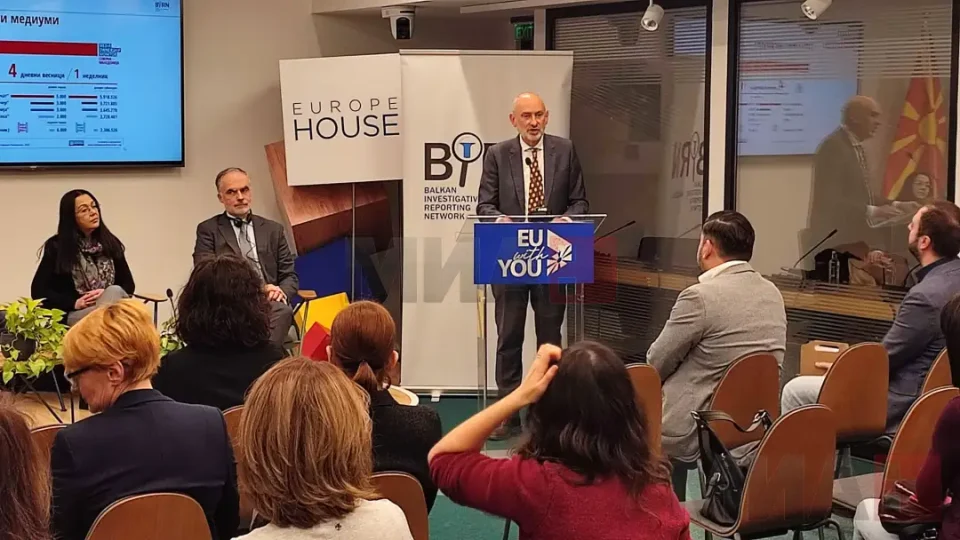The Balkan Investigative Reporting Network (BIRN), in partnership with the Global Media Registry (GMR), introduced a media ownership database in Skopje, aiming to illuminate the landscape of media ownership.
Ana Petrusheva, BIRN’s country director, detailed their extensive six-month collaboration with GMR, emphasizing the pursuit to address pivotal questions about media ownership, reliability of content, and the challenges faced by journalists who operate without clarity on media ownership.
Highlighting Macedonia’s dearth of reliable assessment data, Petrusheva outlined the selection criteria for the database, focusing on the largest TV networks, including the public broadcaster, along with major cable and satellite TV channels. The criteria for print media and radio stations centered on their national coverage and informative content, selecting five of each.
Petrusheva emphasized the crucial importance for citizens, both domestically and internationally, to access concrete and transparent data about media ownership for informed decision-making on their sources of information.
EU Ambassador David Geer stressed the fundamental right of every citizen to know the controllers of the media they consume, acknowledging that while not every owner necessarily influences news, transparency remains paramount. Expressing full support for BIRN and GMR, he anticipated the database becoming a valuable tool for the wider community.
Dragan Sekulovski, Executive Director of the Association of Journalists of Macedonia, discussed concerns about public interest campaigns, revealing a meager allocation from the government and expressing hopes that proposed amendments to these campaigns in Parliament would be rejected.
Over 30 media outlets, spanning print, online, radio, and TV, were chosen for the media ownership project based on their impact and informative content.
This database, part of a larger project supported by the EU and implemented across the Balkans, employs a unified methodology designed by GMR, an independent entity operating since 2021. It will be accessible in Macedonian, Albanian, and English languages, fostering transparency and accessibility across diverse communities.
The Balkan Investigative Reporting Network (BIRN), in partnership with the Global Media Registry (GMR), introduced a media ownership database in Skopje, aiming to illuminate the landscape of media ownership.
Ana Petrusheva, BIRN’s country director, detailed their extensive six-month collaboration with GMR, emphasizing the pursuit to address pivotal questions about media ownership, reliability of content, and the challenges faced by journalists who operate without clarity on media ownership.
Highlighting North Macedonia’s dearth of reliable assessment data, Petrusheva outlined the selection criteria for the database, focusing on the largest TV networks, including the public broadcaster, along with major cable and satellite TV channels. The criteria for print media and radio stations centered on their national coverage and informative content, selecting five of each.
Petrusheva emphasized the crucial importance for citizens, both domestically and internationally, to access concrete and transparent data about media ownership for informed decision-making on their sources of information.
EU Ambassador David Geer stressed the fundamental right of every citizen to know the controllers of the media they consume, acknowledging that while not every owner necessarily influences news, transparency remains paramount. Expressing full support for BIRN and GMR, he anticipated the database becoming a valuable tool for the wider community.
Dragan Sekulovski, Executive Director of the Association of Journalists of Macedonia, discussed concerns about public interest campaigns, revealing a meager allocation from the government and expressing hopes that proposed amendments to these campaigns in Parliament would be rejected.
Over 30 media outlets, spanning print, online, radio, and TV, were chosen for the media ownership project based on their impact and informative content.
This database, part of a larger project supported by the EU and implemented across the Balkans, employs a unified methodology designed by GMR, an independent entity operating since 2021. It will be accessible in Macedonian, Albanian, and English languages, fostering transparency and accessibility across diverse communities.





Comments are closed for this post.